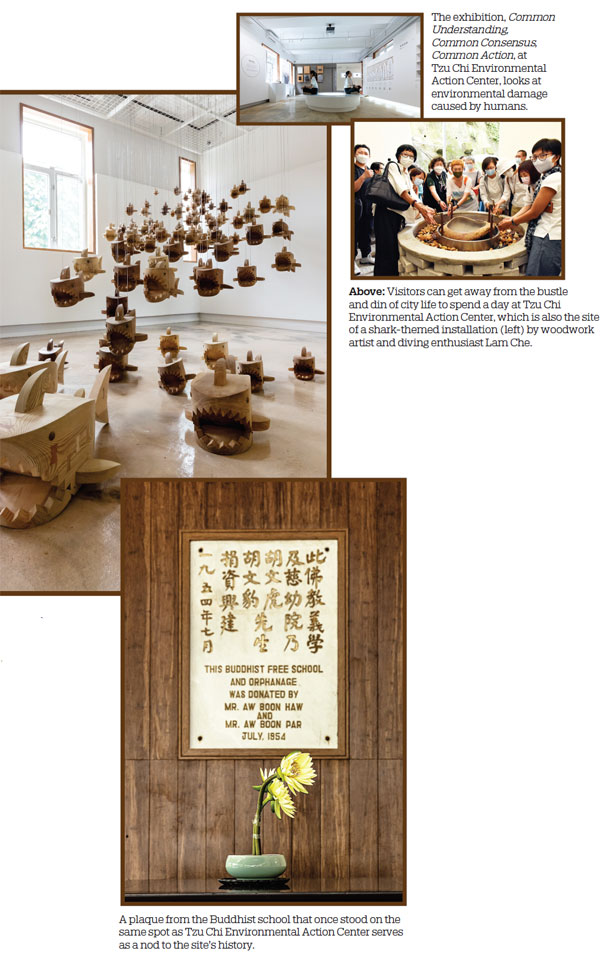Hidden gems in your backyard
Cultural tourism has taken off as more people are discovering lesser-known destinations in Hong Kong. Rebecca Lo takes a walk on the wild side.


Green teams
A slower pace often encompasses a relatively sensitive approach to resources and the marketing acumen to get that message across. Both Lai Chi Wo and Tzu Chi Environmental Action Center in Tai Wai espouse sustainability as a critical element that people can integrate into their everyday life.
The latter was originally a Buddhist primary school for disadvantaged rural children, operated by Chi Hong Ching Yuen. The school was founded in 1954 by Singaporean businessmen and brothers Aw Boon Haw and Aw Boon Par, best known for their Tiger Balm ointment and Tiger Balm Garden, which has since been revitalized into Haw Par Mansion. After relocating the school to Sha Tin, Chi Hong donated the Tai Wai premises to the Buddhist charitable relief organization Tzu Chi Foundation Hong Kong.
Due to the dilapidated conditions of the structure, Tzu Chi began renovating the premises in 2019 with support from the Hong Kong Jockey Club Charities Trust. Architect Corrin Chan was entrusted with installing sustainable features including solar panels, natural ventilation and eco-bamboo on surfaces such as flooring, doors and handrails. Bricks made from recycled polyethylene lining on paper containers are used as paving stones. Daylight was maximized through large windows that look out on the green hills surrounding the complex.
"We reused the yellow clay that formerly clad the building as the base material to make new bricks to surround an old well on the premises," says Chan. "We kept the original trusses after removing the false ceiling."
The result is a complex that retains its country charm, yet is appointed for public use with flexible rooms ideal for informal interactions. Outdoor corridors and terraces link the spaces, underscoring the connection between the architecture and surrounding Tai Wai landscape.
Tzu Chi opened to the public in November as a jack-of-all-trades venue, with a roster of educational programs for the community and its schools.
Along with a comprehensive recycling depot for the community, there is a dining hall that hosts vegetarian cooking demonstrations and workshops. Its multipurpose space offers topical events such as a discussion on the subject of Buddhist vegan food that adheres to philosophies of traditional Chinese medicine.
The center's Da Ai Technology Room displays a variety of recycled apparel and accessories, with details of how many plastic bottles were reused in each case.
An exhibition titled Common Understanding, Common Consensus, Common Action, is displayed in the ground-floor Planet Room. It underscores how natural catastrophes blamed on wind, fire or water often bear the fingerprints of human influence. The show features Carbon Reveries by artist h0nh1m (Chris Cheung). The interactive ink installation depicts a bamboo forest, which drains of color at the touch of a warm hand.
Upstairs, in the Jockey Club Eco Co-Creation Space, a second exhibition, A Breeze from the Woods, presents sculptor Lam Che's commentary on ocean conservation. The threat to its animals is captured through an installation consisting of 108 wooden sharks.
"As opposed to demolition and reconstruction, restoration preserves not only the structure but also the original intention for the building at the time of construction - that is, to provide education," says Chow Yuk-lin, a longtime volunteer at the Tzu Chi center.
"Architecture makes no noise but tells stories of the past," notes Chan, the architect who oversaw the restoration of Tzu Chi. "Going forward, we hope that this structure can breathe again. Its green architecture is a means of expressing the Action Center's aim of promoting environmental protection."
- Xi sends congratulatory message to 39th African Union Summit
- A taste of tradition: Jinjiang's Spring Festival delights
- IUCN chief sends Chinese New Year greetings
- China upgrades Xiong'an high-tech zone to national level
- Highest railway station welcomes 1st Spring Festival travel rush
- Xi extends Chinese New Year greetings to ring in Year of Horse





































